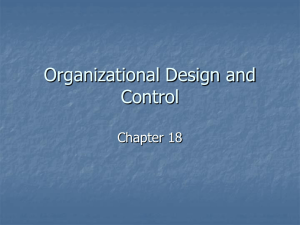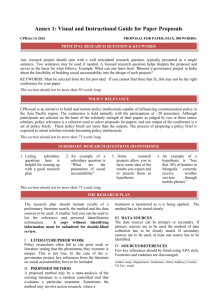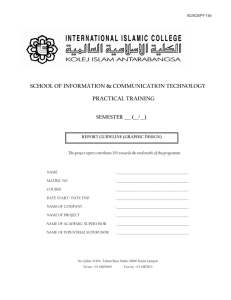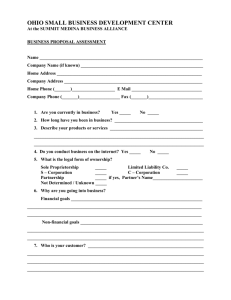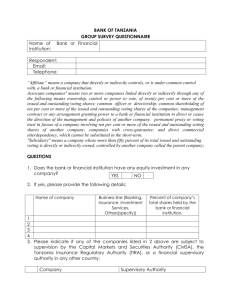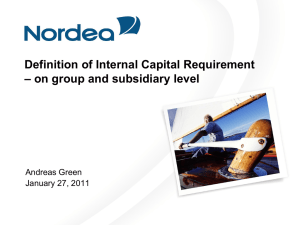Financing Expenses
advertisement
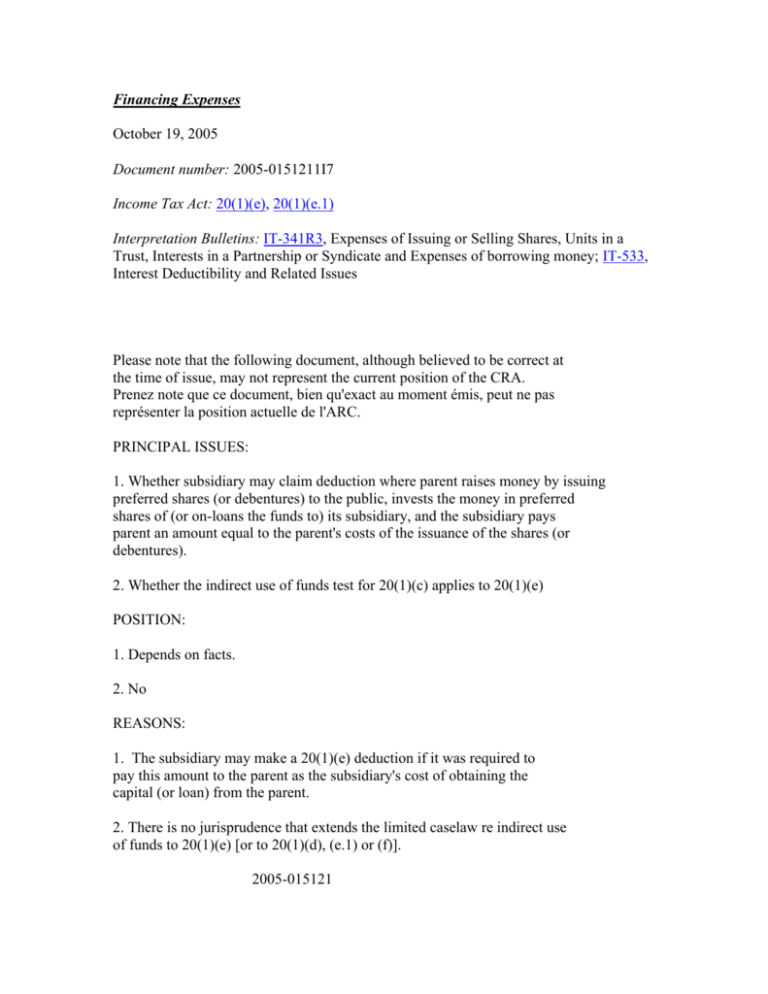
Financing Expenses October 19, 2005 Document number: 2005-0151211I7 Income Tax Act: 20(1)(e), 20(1)(e.1) Interpretation Bulletins: IT-341R3, Expenses of Issuing or Selling Shares, Units in a Trust, Interests in a Partnership or Syndicate and Expenses of borrowing money; IT-533, Interest Deductibility and Related Issues Please note that the following document, although believed to be correct at the time of issue, may not represent the current position of the CRA. Prenez note que ce document, bien qu'exact au moment émis, peut ne pas représenter la position actuelle de l'ARC. PRINCIPAL ISSUES: 1. Whether subsidiary may claim deduction where parent raises money by issuing preferred shares (or debentures) to the public, invests the money in preferred shares of (or on-loans the funds to) its subsidiary, and the subsidiary pays parent an amount equal to the parent's costs of the issuance of the shares (or debentures). 2. Whether the indirect use of funds test for 20(1)(c) applies to 20(1)(e) POSITION: 1. Depends on facts. 2. No REASONS: 1. The subsidiary may make a 20(1)(e) deduction if it was required to pay this amount to the parent as the subsidiary's cost of obtaining the capital (or loan) from the parent. 2. There is no jurisprudence that extends the limited caselaw re indirect use of funds to 20(1)(e) [or to 20(1)(d), (e.1) or (f)]. 2005-015121 WINNIPEG TSO HEADQUARTERS Attention: Michael Luzny Denise Dalphy, LL.B. Technical Advisor (613) 941-1722 Internal Corporate Financing October 19, 2005 This is in response to your memorandum of September 16, 2005 wherein you requested our views on certain financing transactions and the application of paragraphs 20(1)(e) and (e.1) of the Income Tax Act (the "Act"). Description of corporate structure Your questions all involve one family of corporations: A Co, a public corporation (which has small losses), owns all of the shares of B Co, a XXXXXXXXXX corporation with significant taxable income, which in turn owns all of the shares of C Co, which owns all of the shares of D Co, a XXXXXXXXXX company with significant taxable income. The companies are all residents of Canada. Situation #1 In XXXXXXXXXX , A Co issued $XXXXXXXXXX of preferred shares to the public and incurred shares issue costs of $XXXXXXXXXX . A Co used the proceeds to invest in preferred shares of D Co, which have the same terms as the preferred shares issued by A Co. The cost of the share issuance by D Co to A was minimal. D Co reimbursed A Co for the above issue costs and D Co has been deducting these costs under paragraph 20(1)(e) of the Act over a XXXXXXXXXX -year period. You have asked whether D Co is entitled to take these deductions. Situation #2 In XXXXXXXXXX , A Co issued $XXXXXXXXXX of interest-bearing debentures to arms length parties. A Co incurred issue costs of $XXXXXXXXXX . A Co used the borrowed money by lending them to D Co at the same interest rate. The term of the debt is XXXXXXXXXX years. As D XXXXXXXXXX does not deduct the interest paid to A. D Co used these funds to pay a $XXXXXXXXXX dividend to C Co. D Co reimbursed A Co for the issue costs and deducted them under paragraphs 20(1)(e) and (e.1) of the Act. You also advised that it appears possible that D Co's non-consolidated retained earnings is significantly less than the $XXXXXXXXXX dividend it paid out. You have asked whether D Co is entitled to take these deductions and whether the fact that the indebtedness of D Co is for a term of XXXXXXXXXX years would preclude it from deducting amounts under paragraph 20(1)(e.1) of the Act. You have also asked whether the comments in paragraph 23 of IT-533 are limited to paragraph 20(1)(c) of the Act or whether they also apply to 20(1)(e) and (e.1) of the Act. Our Comments Payment by a subsidiary corporation of parent's share issue costs where proceeds of share issue were used to acquire preferred shares of subsidiary Amounts are only deductible under paragraph 20(1)(e) of the Act if they were incurred by that taxpayer in the course of the activities listed in the subparagraphs therein. The fact that a taxpayer makes a payment (a "reimbursement") to another person that relates to that person's financing expenses (regardless of whether that person incurred the financing costs in the course of a share issue, debt issue or a restructuring) does not - in itself - permit a taxpayer to deduct the amount that it paid to that person. However, if the taxpayer that made the reimbursement can demonstrate that it paid the amount in the course of the activities of the taxpayer that are listed in subparagraph 20(1)(e)(i), (ii), (ii.1) or (ii.2) of the Act, then the taxpayer would be entitled to a deduction under paragraph 20(1)(e) of the Act. An example would be the situation in the Laidlaw case (74 DTC 1179). In that case, the subsidiary corporation wanted to raise money from the public to use in its business. For commercial reasons, the subsidiary corporation could not do so and therefore the parent corporation raised the money (and paid $50,000 in financing costs), which the subsidiary corporation then used in its business. The subsidiary corporation paid so-called "management fees" of $61,000 to its parent. The Court concluded that based on the evidence (the credible testimony of an accountant with a CA firm where the parent and subsidiary corporation were clients) the amounts were deductible, regardless of the name given to the fees. The Court summarized the testimony of the accountant: "His evidence is that, long before the end of the 1969 fiscal year, it was clearly understood that a sum of money would be paid to Motorways Transport [the parent corporation] as the result of the efforts of DeGroote [the president of the parent corporation] in obtaining this financing." It is quite likely that a parent company that raised money from the public so that it could provide that money to its subsidiary would have insisted that the subsidiary corporation pay a financing fee to the parent in at least an amount that the parent corporation had to pay in order to raise the money. In this situation, there may or may not be documentation that shows whether D Co agreed to reimburse A Co's share issue costs in order to obtain A Co's agreement to invest in the preferred shares of D Co; however, perhaps interviews that were conducted with representatives of the companies during your audit may assist in resolving this question. Paragraph 10 of Interpretation Bulletin IT-341R3 ("IT-341R3") You have asked whether the comments in paragraph 10 of IT-341R3 would limit the deduction to A Co. Paragraph 10 in IT-341R3 makes two points: 1) If a parent pays the financing costs of its subsidiary, the parent cannot deduct the costs. [The taxpayer (parent) did not incur any expenses in the course of issuing its own shares or debt, or restructuring.] and 2) If a parent pays the financing costs of its subsidiary, and if the subsidiary reimburses a reasonable amount to the parent, the subsidiary may deduct the amount that it paid to the parent. [It is almost certain in a parent/sub situation that the subsidiary made the payment to the parent because the parent would likely dictate that the subsidiary do so in order for the subsidiary to get the financing. The subsidiary is actually paying financing fees to the parent in the amount reimbursed and a strong connection would exist between the fees that the subsidiary is paying to the parent and the subsidiary issuing shares or debt]. While we agree with these comments in IT-341R3, they do not cover every circumstance between a parent and its subsidiary where paragraph 20(1)(e) of the Act may apply. CCH Comments on Parent/Sub Financing Costs and Paragraph 20(1)(e) You provided us with the following text in CCH: "[¶2677] Cost of Financial Restructuring Revenue Canada was asked to comment on a situation where distressed preferred shares are issued by a subsidiary corporation and the proceeds of the preferred share issue are used to acquire or pay down outstanding debt of the parent corporation. The question posed to Revenue Canada was whether the parent corporation could deduct the costs incurred by the subsidiary in issuing the shares if these costs were paid by the parent corporation and the subsidiary used the borrowed funds to either acquire debts of the parent corporation or to pay down debts of the parent. Where the parent corporation agrees to incur the costs of the subsidiary issuing shares as part of an agreement to borrow funds from the subsidiary, Revenue Canada is of the view that the parent corporation would be entitled to deduct an amount under subparagraph 20(1)(e)(ii), providing the other requirements of that section were satisfied. Where the subsidiary acquires the parent's debt as part of the restructuring, Revenue Canada is of the view that the parent would be entitled to a deduction if the terms of the debt were modified and the costs were incurred by the parent as part of the agreement to modify the terms of the debt. Revenue Canada also pointed out that they had ruled favourably on situations where a reasonable interest or borrowing charge had been made to absorb the costs incurred by the subsidiary. This latter approach would be consistent with the decision of the Tax Review Board in Laidlaw Transport Limited v. M.N.R., 74 DTC 1179 (T.R.B.)." In the above scenario, the parent pays financing costs that its subsidiary incurred in issuing distress preferred shares. The parent may get a deduction under 20(1)(e) of the Act but only if the parent qualifies on its own account. If the real reason why the parent made this payment was so that the parent could restructure its debt, then the parent may qualify for a deduction under paragraph 20(1)(e) of the Act. The same logic discussed above would apply to situation #2. If D Co was required to pay A Co an amount that equalled A Co's issue costs and the reason why D Co made the payment was so that A Co would agree to on-loan the money to D Co, then D Co would not be precluded from deducting its debt financing costs under paragraph 20(1)(e) of the Act since it (D Co) would have incurred a financing expense in the course of a borrowing of money. However, D Co would have to satisfy all of the requirements under subparagraph 20(1)(e)(ii) of the Act in order to deduct its debt financing costs [please see my comments below]. Deductibility of Financing Costs Where Borrowed Money is Used to Pay a Dividend Subparagraph 20(1)(e)(ii) of the Act has a use test - the money borrowed by the taxpayer must be "used by the taxpayer for the purpose of earning income from a business or property (other than money used by the taxpayer for the purpose of acquiring property the income from which would be exempt)". In this case, the borrower, D Co used the money to pay dividends to its parent. It is difficult to conceive of an argument that could be made that would convince a court that, by paying dividends to a parent, a subsidiary has used borrowed money for an income earning purpose. IT-533 - Indirect Use of Funds The Courts have applied an indirect use test to paragraph 20(1)(c) of the Act on limited occasions, in particular, in Trans-Prairie Pipelines Ltd. v. MNR, 70 DTC 6351 and Penn Ventilator Canada Ltd. v. The Queen, 2002 DTC 1498 (TCC). There is no jurisprudence that has extended the application of this principle to paragraph 20(1)(e) of the Act [or to paragraphs 20(1)(d) or (e.1) or (f) of the Act]. Accordingly, the comments in paragraphs 22 to 26 of IT533 would not apply to paragraph 20(1)(e) of the Act. Paragraph 20(1)(e.1) With respect to the availability to D Co of a deduction under paragraph 20(1)(e.1) of the Act for part of the amount paid to A Co in the course of D Co's borrowing from A Co, D Co would have to demonstrate that the amount that it wants to deduct related "solely to the year" in respect of which it is seeking the deduction. We have no evidence that this is the case, and accordingly it would be reasonable to assume that the costs relate to the XXXXXXXXXX -year debt (unless, of course, you are provided with information that contradicts this assumption). Agency Finally, regardless of whether A Co may have acted as D Co's agent in borrowing the money, it is our view that the payment of dividends by a subsidiary to a parent is not a use that is "for the purpose of earning income from a business or property". For your information a copy of this memorandum will be severed using the Access to Information Act criteria and placed in the Canada Customs and Revenue Agency's electronic library. A severed copy will also be distributed to the commercial tax publishers for inclusion in their databases. The severing process will remove all material that is not subject to disclosure, including information that could disclose the identity of the taxpayer. Should your client request a copy of this memorandum, they can be provided with the electronic library version, or they may request a severed copy using the Privacy Act criteria which does not remove client identity. Requests for this latter version should be made by you to Mrs. Jackie Page at (819) 994-2898. A copy will be sent to you for delivery to the client. If you have any questions concerning this matter please feel free to contact us. Steve Tevlin for Director Financial Sector and Exempt Entities Division Income Tax Rulings Directorate Policy and Planning Branch

